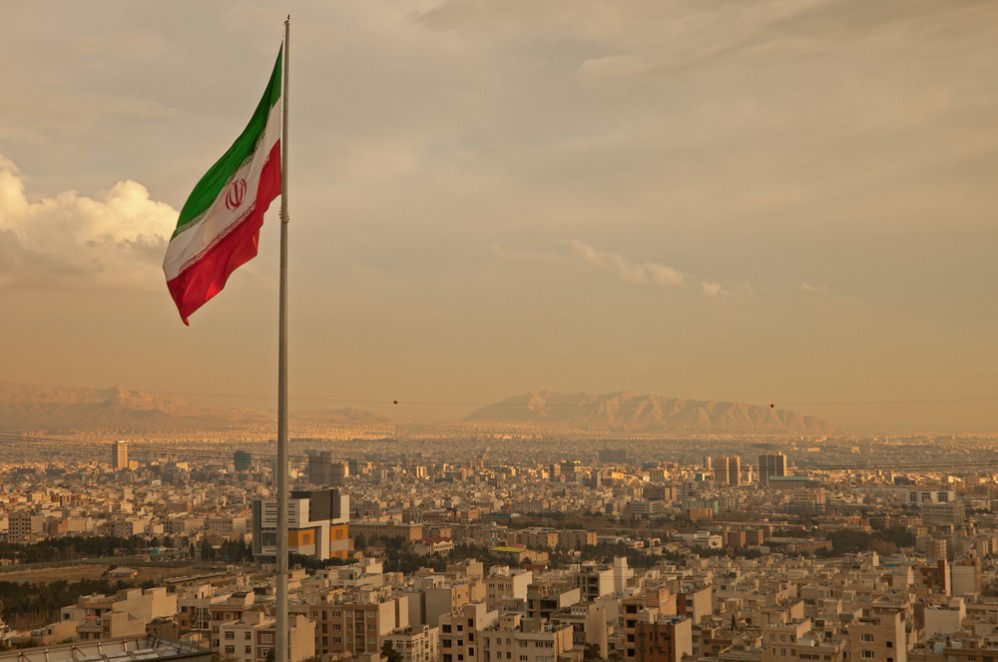Iran Deal Supporters Are Willing To Sell Out The U.S. To Jihadists


Among the talking points bouncing around the Iran Deal’s devoted echo chamber in the wake of President Trump’s decertification decision is one of proponents’ most honest and simultaneously sordid admissions: The JCPOA means big business for the West. As long as the money is good, let us all pretend we are not subsidizing the world’s leading state sponsor of jihad and protect the pact at all costs.
This position has been echoed implicitly by European officials, who have feverishly lobbied the U.S. against unwinding the Obama administration’s non-treaty in recent weeks.
EU Ambassador to the U.S. David O’Sullivan asserts that if America nixes the JCPOA, “the European Union will act to protect the legitimate interests of our companies.”
“People in Brussels,” O’Sullivan says, “are looking at whether blocking statutes need to be upgraded or updated,” as a means of subverting prospective re-imposed or new U.S. sanctions.
A Financial Times article titled “Europe battles to save commercial ties with Iran” published mere hours before President Trump’s anticipated speech on Iran policy notes:
European efforts to develop “ironclad” protection against possible fresh U.S. sanctions have so far kept hitting a brick wall, said Nathalie Tocci, director of the Institute for International Affairs think-tank in Rome and also an adviser to Federica Mogherini, the EU’s foreign policy chief. “That’s why so much political capital has been put in to saving the deal ,” she said. [Emphasis mine.]
German Ambassador to the U.S. Peter Wittig, a supporter of the Iran Deal , laments that “German companies have suffered billions and billions and billions of dollars” from previous Iran sanctions.
Leave aside for a second the temerity of an EU whose security, and thus economic activity, is in large part ensured and aided by the U.S. threatening countermeasures to thwart American sanctions on Iran.
Who knew that the progressive Wilsonians of the West would cling to the Iran Deal out of fealty to greedy multinational corporations? Or that such progressives could look past the transgressions of murderous, human rights-violating theocracies to support free trade?
Indeed, the Iran Deal has meant billions of dollars in contracts between big business and Tehran, and much of this commerce concerns strategically significant sectors.
Boeing and Airbus have been the two biggest winners of the Iran Deal, each agreeing to airplane sales to Iranian airlines collectively totaling over $30 billion.
In the all-important energy sector, France’s Total SA and China’s China National Petroleum Corporation entered into a $5 billion agreement to develop Iran’s share of one of the world’s largest natural gas fields. Bloomberg reports that more than 30 foreign companies have qualified for Iranian oil and gas projects since the JCPOA was implemented, including among others such major companies as Royal Dutch Shell, Schlumberger, and Rosneft.
This summer, French automobile maker Renault announced plans to increase its car manufacturing in Iran by 75 percent. They are following in the footsteps of fellow French automobile maker Peugot , which inked a €400 million deal with Iran’s Khodro in a joint venture expected to produce up to 200,000 cars per year.
The recently held 4th annual Europe-Iran Forum, the annual gathering for “business, government, and civil society leaders committed to Iran’s responsible and robust economic development” attended by various European political officials and sponsored by businesses such as KPMG and British Airways, personified the economic relationships crystallizing between the West and Iran.
Now we understand why then-Secretary of State John Kerry was at pains to push Western entities to trade with Iran. Sec. Kerry served as Iran’s lobbyist-in-chief because he knew deeper economic integration between the West and Iran would make it that much more difficult politically to unwind the culmination of his life’s work undermining U.S. interests. Left unspoken is that such dalliances with Iran inextricably intertwine the West with those who directly threaten and undermine us.
Providing the world’s leading state sponsor of jihad with billions of dollars in cash, and trading it essential goods and services, merely bolster its malicious activities.
To paraphrase the old saw attributed to Lenin: “The Iran Deal dupes and devotees sell the mullahs the rope with which to hang them.”
Consider, for example, the Boeing and Airbus deals with Iran Air. As the Foundation of Defense of Democracies (FDD) noted:
Iran Air was designated by the U.S. Treasury Department on June 23, 2011 for “providing material support and services to the Islamic Revolutionary Guard Corps (IRGC) and Ministry of Defense and Armed Forces Logistics (MODAFL).” MODAFL is designated under Executive Order 13382 for its proliferation activities.” Treasury stated that “commercial Iran Air flights have been used to transport missile or rocket components to Syria.”
FDD reports that Iran Air never suspended such activities. Since the consummation of the JCPOA, Iranian airlines have continued to ferry “weapons and militants to the Syrian regime” over hundreds of flights.
So today we in the West are knowingly colluding with terror-supporting entities.
Iran’s Economy Supports The IRGC
More broadly, the aforementioned 150,000 active duty member-strong IRGC —which has American blood on its hands from the Beirut marine barrack bombings in 1983 to the roadside EFP attacks during the Iraq War—is deeply enmeshed in all sectors of Iran’s economy, from oil and gas, to shipping, aviation finance, and telecommunications. At the time of the Iran Deal’s passage, it controlled an estimated 20 to 40 percent of the nation’s economy, and took in income up to an estimated one-sixth of its GDP.
According to congressional sanction legislation the Trump administration signed into law, the IRGC “is responsible for implementing Iran’s international program of destabilizing activities, support for acts of international terrorism, and ballistic missile program.” By that law, the administration has now formally announced the IRGC will be designated by the U.S. Treasury Department pursuant to an executive order sanctioning support for terrorist groups.
As Treasury Secretary Mnuchin noted in the Treasury Department’s press release: “The IRGC has played a central role to Iran becoming the world’s foremost state sponsor of terror … We urge the private sector to recognize that the IRGC permeates much of the Iranian economy, and those who transact with IRGC-controlled companies do so at great risk.”
The devil will be in the details of implementation to see if these words are made concrete with action.
Regardless, it is clear that to this point the West has been directly and indirectly supporting IRGC’s jihadism by doing business with Iran. In fact, the express purpose of Iran’s economy is to spread the very Islamic movement of which the IRGC plays an integral part.
As Iran’s constitution states, in accordance with Islam, its “economy is a means that is not expected to do anything except better facilitate reaching the goal [of furthering and exporting Iran’s Islamic revolution ].” Trade is a means to the Islamic revolutionary end.
This Deal Won’t Bring Political Liberalization In Iran
Supporters of the Iran Deal assert that increased commerce will help bring Iran into the “community of nations,” and suggest that political liberalization will follow economic liberalization. But Russia and China prove how disastrously wrong this theory is.
What the Iran Deal actually does is create a richer, more powerful mullocracy better able to fund its bellicose activities. When and if Iran does build or acquire nuclear weapons, it will be in a far stronger position than it was before the deal was struck. Meanwhile, Iran may be closer to nuclear weapons than anyone knows.
Even if U.S. intelligence—which has chronically underestimated weapons development rates among rogue regimes (see: North Korea )—is accurate on the current state of Iran’s nuclear program, consider the following:
Iran was in violation of the JCPOA from day one —as it required secret exemptions to meet the standards needed to begin implementing the deal, and has continued to violate the agreement in subsequent months.
German intelligence reports indicate that Iran tried at least 32 times to procure equipment probably or definitely related to nuclear or ballistic missile proliferation in 2016.
The IAEA has admitted it cannot inspect the very military sites where Iran’s illicit nuclear activities are likely to be carried out under Section T of the Iran Deal . The National Council of Resistance of Iran (NCRI) recently released an investigative report alleging four such major sites that “with high degrees of certainty” are involved in aspects of an ongoing military nuclear program. Iran has said it is unwilling to provide access to such military sites .
We’ve Been Flying Blind With The Iran Deal
President Trump in his decertification announcement ordered intelligence agencies to analyze and report on alleged Iranian dealings with North Korea over its nuclear program. This implies we have been flying somewhat blind with respect to a logical and known pathway to an Iranian nuclear weapon.
Even if a notoriously deceptive regime at war with the West since 1979 was somehow more scrupulous than ever before, by deed it clearly does not respect the deal or the partners at the table.
Of course, regarding the trustworthiness of Iran’s leaders, it bares noting that none other than the “moderate” President Rouhani previously admitted that Iran twice played the West in negotiations that allowed Tehran to continue advancing its illicit nuclear research.
Iran Deal supporters are willing to sell out their nations to jihadists who wish to do them harm.
This is worse than appeasement. It is complicity with evil.
http://thefederalist.com/2017/10/13/iran-deal-supporters-willing-sell-u-s-jihadists/
Ben Weingarten (@bhweingarten) is a writer, podcaster and media consultant. You can find his work at benweingarten.com. In 2015, he was selected as a Publius Fellow to the Claremont Institute.


This is the infamous "deal" that never went to Congress. The deal which is now so hard to get rid of since all the goodies were loaded up front and given to Iran. All that is left is what the US gets - inspections with advance notice to Iran. For now, Trump has wisely kicked it over to the timid politicians in Congress
This is what concerns me:
Yup, and Iran doesn't have to let us see military sites - written right into the deal! Congress now has maybe 60 days to review it, maybe impose limited sanctions and if they do nothing Trump may scrap the deal. Scrapping the deal may be a good thing since we are also supposed to protect Iran's sites as part of this insane arrangement. If Trump does end up scrapping it, I only hope he gives the long range bombers to Israel needed to bomb those sites.
If Iran gets the news that the US is giving Israel the newer more powerful bunker bombs they's going to know what's coming.
Yes, It will be a replay of what happened to the Syrian nuclear project